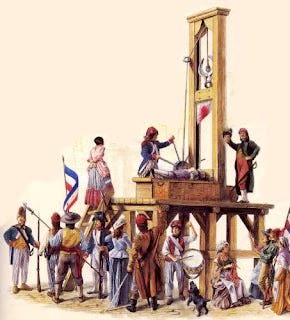“It was the best of times, it was the worst of times…”
This is the prescient opening of Charles Dickens’s A Tale of Two Cities. The two cities in his tale are London and Paris, and the book is set during the time of the French Revolution, the “Reign of Terror.” If you read it or any history book that details the events of that time in the late 18th century, you will be glad you live now and not then.

Yet we hear from the demagogues of today, “This is the worst time ever,” banking (literally) on people’s ignorance of history. This leads to polarization, jumping on bandwagons, groupthink, tribalism, and contemptuous rhetoric, such as calling one side “a basket of deplorables” or the other side engaging in name calling–"Crazy” or “Crooked.” If the stakes are so high, they say, these attention-grabbing tactics are necessary. So it’s piled a mile wide and an inch deep, or as Shakespeare (who was much better at insults) said in Macbeth, it’s “full of sound and fury, signifying nothing.”
Are bad things happening? You betcha. And yes, it can get worse. But I would take now over the Middle Ages and the Black Death1 any day.
We don’t want to ever minimize human suffering, either in the past or the present. I help people learn not to minimize their own personal suffering, as so many who suffer are prone to do, in order to deal with trauma or to cope with unhealthy relationships where they must become small in order to pacify a big bully in their lives. But we also want to be careful about our own tendency to magnify evil in order to justify our own opinions. It’s tricky.
Negativity bias is something our brains do, pointing out to us all the possible dangers in our path so we steer clear and stay safe. Sometimes, when we have had a slough of suffering, this radar system stays switched on and honed in, filtering even safe or neutral things as threats. This compromises resiliency in your nervous system, leading to something called learned helplessness, where a person becomes stuck in a fearful state, feeling unable to muster the strength to make meaningful changes.
As a trauma-informed therapist, I am sensitive to this felt inability to deal with life’s normal ups and downs. But part of my job is to help traumatized people get unstuck (aka, healing), to develop resilience into their lives and bodies. One way to do this, described by trauma expert Peter Levine, is pendulation, the ability to move in and out of a trauma state, accessing calm for a time and then feeling capable of entering back into a distress mode without getting trapped there.
Some breath practitioners will suggest breathing in calmness and exhaling stress, as a strategy for picturing this back and forth ability. The goal isn’t to avoid stressful situations altogether. You would need to be encased in bubble wrap to do this and miss out living your “one wild and precious life.” 2
Some victim advocates have the mistaken idea that when a person who has been through trauma is able to access anger, then they are in a good place. Yes, it can be a part of the process of healing to be able to acknowledge the evil that has been done to you and from a sense of justice, feel anger about that injustice. Some people are afraid of anger, worried they are sinning when they are angry, but the Bible says, “Be angry, and do not sin.”3
It’s okay to feel angry. But it is not helpful to stay there. Yet that is where we seem to be stuck in this cultural moment.
I am grateful for my friends who are advocates for victims and survivors of horrible abuse. Most of them have experienced their own great suffering. I count myself among those who advocate for and educate about this bane of our time, especially in spiritual contexts. However, I notice that some of them are prone to get stuck in anger and encourage others to join them there. Their motives are good. They see terrible evil and want to fight it. Yet they rely heavily on utilitarian means to achieve their good end, and that strategy is not effective or ultimately moral.
This is NOT a political post (and to keep it that way, I am shutting off comments). I have clients, friends, family, and people I worship with each week in church who have political views of all stripes. Some even (gasp!) refuse to vote on political principle. I have opinions, too. I’m sitting in my local library as I type this, and glancing at the books nearby, I see an entire shelf with books about the president-elect, some fer him and and some agin’ him, but so far there are no riots or even smoke emanating from that close contact. God bless libraries.
I rarely visit social media any more, and even more rarely do I interact there. Sometimes I would like to extricate myself entirely, but I still feel the need to maintain some presence and connection there, occasionally sharing things I hope are edifying or educational. The other day, though, I commented on a post and I quickly got unfriended. This was disappointing but not devastating. I admire the person who decided to unfriend me; she is an amazing advocate for abuse survivors and has survived a lot of her own trauma.
The issue started when she posted a snarky meme, marking herself “safe from having to spend Thanksgiving with MAGA relatives.” Fine…she can have opinions, too! And she can also set boundaries about who she wants to spend time with over the holidays. Amen! But someone commented, another person I greatly admire, saying she was hurt by this because she voted for the guy, and she wondered if she would really be disfellowshipped for having done so. I know this lady to be a sweet soul and I could see how she might wonder if she would truly be cast into outer darkness for her political choices. I was surprised at the response to her. It was swift, harsh, and unkind.
Yes, I stepped into it, not to express a political view, which didn’t seem to be the issue. I commented to the hostess of the page (and I do respect that it’s her space to use as she sees fit, even if she wants to unfriend me) that I was in great sympathy with her reasons for her viewpoints but that I also wondered if using harsh and dismissive tactics was the means we should use to fight the battle of supporting victims and survivors of abuse. I reminded her that Jesus says we are to love our enemies and that people will know we are Christians by our love.
I also believe (which I didn’t have a chance to say in that space as I was swiftly unfriended) that there are evil people in the world with whom we should have nothing to do, unless it is to rebuke them. Yet there are many reasons that people might vote for the guy she doesn’t like, and while I might disagree with those reasons, I also know that I have been very judgmental of others in the past and that this is something I am working on. One way I am doing that is by practicing curiosity instead of contempt. I’m still not very good at it, but I want to be better and invite others to join me in taking Jesus seriously in what he preached in the Sermon on the Mount.
The real act of, say, building a friendship or creating a community involves performing a series of small, concrete social actions well: disagreeing without poisoning the relationship; revealing vulnerability at the appropriate pace; being a good listener; knowing how to end a conversation gracefully; knowing how to ask for and offer forgiveness; knowing how to let someone down without breaking their heart; knowing how to sit with someone who is suffering; knowing how to host a gathering where everyone feels embraced; knowing how to see things from another’s point of view. (David Brooks in How to Know a Person: The Art of Seeing Others Deeply and Being Deeply Seen)
Dr. Murray Bowen (one of the fathers of family systems theory) talked about the common strategy of emotional cutoff that people use to avoid the anxiety of actually interacting with people to resolve a conflict. He describes this as unhealthy and unhelpful. Again, I want to emphasize that there are definitely times to cut people out of your life! Extreme narcissistic abuse, domestic violence, sexual abuse, spiritual abuse…if you can get away, please do! If you can help someone get away, please do! But there are lots and lots of situations which may be uncomfortable without being “toxic.” Often there are debates to be had, conversations to invite, listening that should happen. Real change will not occur until we open ourselves to hard interactions, with a posture of love and humility. This may require some practice with pendulation if you are recovering from trauma.
My encouragement during this Advent season, remembering the angels proclaiming “Peace on earth, goodwill to men,” is to be a person who is open to others who don’t think like you, look like you, talk like you. Remember your own frailties as well as your strengths, looking to God for wisdom and help when you realize your limitations. It’s more than okay to have healthy boundaries. But you need other people, too, even people who might surprise you.
Canceled (poem by me) If I speak in the tongues of men or of angels, but do not have love, I am only a resounding gong or a clanging cymbal. (I Corinthians 13:1) Unfriended for defending a friend. Invoking love, pleading kindness, the door was slammed in my face. No place for reminders of our purpose. Bang! A clanging cymbal in return for a gentle rebuke. Surprised at such noise followed by silence from one who centers female voices. No choices, no freedom of conscience to digress. All is transgression that questions this status quo. Woe to those who disagree. No nuance allowed. Only loud protests from the party line. Fine. I tried. I will take my stand alone but not alone. Those who suffer don’t give a damn about angels on pins when they are pricked with pain. Anxious eyes longing for relief, scanning for safety, a soft place to land, a cool cup of water, a soft blanket of quiet compassion to calm them down–warm words of love to remind them we are all in this together. I find the means matter much or else we all end up in the same place. Let us return to Love.
During the mid-14th century, this plague wiped out as much as 50% of the population of Europe.
Mary Oliver
Ephesians 4:26




